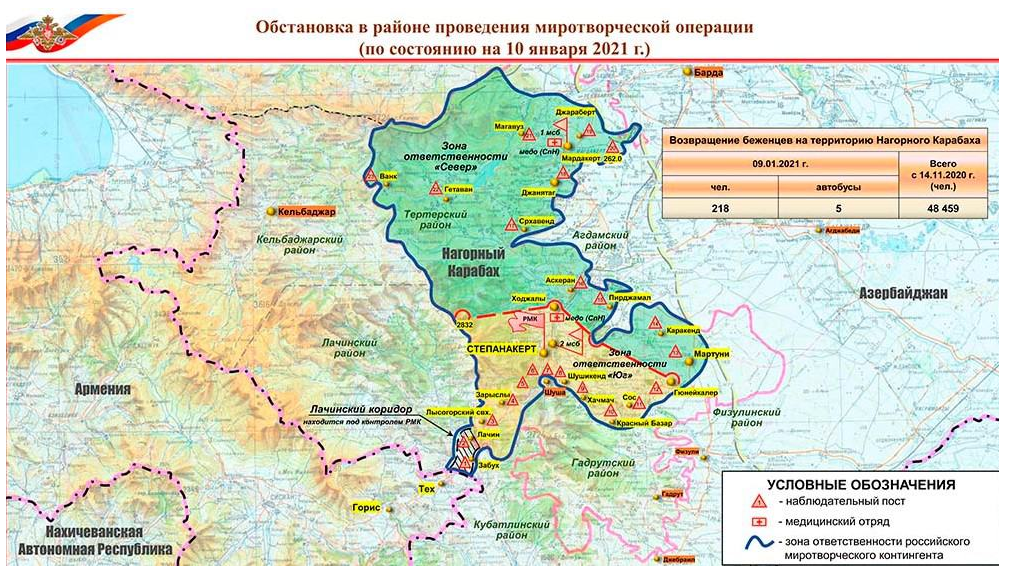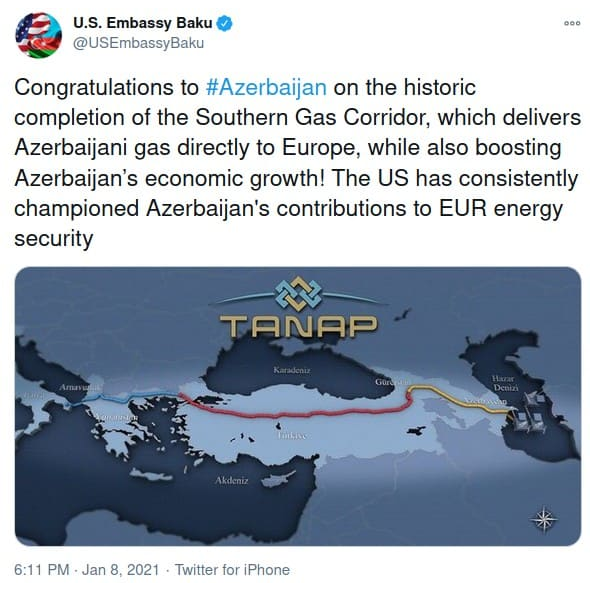By David Davidian
There is no lack of explanations for the course of events in the southern Caucasus since September 27, 2020, when a large-scale Azerbaijani attack began on Nagorno-Karabakh (NK) as the Second Karabakh War. Forty-four days later, on November 9, 2020, a Russian-sponsored ceasefire was signed between Armenia and Azerbaijan.

This article looks back several years and offers competing hypotheses for the origins of the conditions that resulted in this incomplete but successful Azerbaijani offensive, and exposed follies that sadly characterize this region of the ex-Soviet Union.
Given the publicity this war received last fall, background information abounds. It suffices to state that NK is a region inhabited by an Armenian majority since time immemorial but placed under Soviet Azerbaijani jurisdiction in 1923. During the disintegration of the Soviet Union, this Armenian-majority region initially fought Azerbaijan to unite with Armenia. In May 1994 of this First Karabakh War, a ceasefire signed between Armenians and Azerbaijan resulted in NK and areas surrounding it declaring itself a sovereign entity, even as no state went on to recognize it as such, including Armenia.
Twenty-six years of near-fruitless negotiations between Armenia and Azerbaijan ended sometime during the summer of 2020. The OSCE Minsk Group facilitated years of talks. A noteworthy contribution of the Minsk Group was known as the Madrid Principles. While the wording changed slightly over the years, both Armenia and Azerbaijan had issues with these principles. Azerbaijan didn’t want an interim solution nor a referendum without NK being under its jurisdiction. Armenians feared the lack of any security or status in return for the ceding of land. Between 2015 and 2019, Russia’s Foreign Minister Sergei Lavrov developed a version of these principles, known as the Lavrov Plan. Interestingly, the November 9, 2020 armistice includes critical elements of the Lavrov Plan.
| Madrid Principles | Lavrov Plan | November 9 Armistice |
| Return of the territories surrounding NK to Azerbaijani control. | Phased return of five, then two more territories surrounding NK. | All territories surrounding NK captured or agreed ceded to Azerbaijan. |
| An interim status for NK providing guarantees for security and self-governance. | The status of Nagorno-Karabakh remains unresolved for the time being. | No status yet announced for NK |
| A corridor linking Armenia to Nagorno-Karabakh. | Determine a corridor | A corridor exists |
| Future determination of the final legal status of Nagorno-Karabakh through a legally binding referendum. | Varous Azererbaijani reports claim a referendum is equivalent to its independence. | Non-existent. Baku said it would never have an Armenian state within Azerbaijan. Azerbaijan’s constitution is unitary, not federal. |
| The right of all internally displaced persons and refugees to return to their former places of residence. | Unclear | A process is in place for Azerbaijanis to return, but Armenians were forced off ceded or captured lands. |
| International security guarantees that would include a peacekeeping operation. | Russian peacekeepers would be installed. | Russian peacekeepers are installed. |
A recent Russian military peacekeeper map shows what remains of Armenian NK in green and yellow within the blue outline. Lands to the west were ceded, and south towards Iran captured by Azerbaijan.

The two regional powers that have fought a dozen wars over the centuries, Turkey and Russia, each have interests that coincide and conflict. The BBC’s pro-Azerbaijani reporting on this war was not just in support of BP’s $75B-plus investment in the BTC pipeline infrastructure and Azerbaijani hydrocarbon extraction. NATO has taken up Great Britain’s two-century penchant of countering Russian expansionism.
The Arab Spring offered opportunities for geo-ideological expansionist Turkey and politically expansionist Russia. Northern Syria and Libya were (and still are) locations of contention and agreement. The former became a military bazaar, especially after the United States effectively pulled out of Syria but specifically with US President Trump giving Turkish President Erdogan the green light to enter northern Syria. Northern Syria is now under Turkish occupation. The Turkish military periodically does the same in northern Iraq, chasing the PKK, with limited Iraqi approval. Syrian Kurds, Turkish-sponsored jihadists factions, and the Turkish-backed Syrian National Army all became pawns in this game of “Go.” Agreements between Turkey and Russia in Syria could easily result in collateral damage in other contested areas, such as the Russian absorption of Crimea and the southern Caucasus’s republics. Turkey already has enormous influence in Georgia, and Azerbaijan is Georgia’s leading foreign investor. Georgia considers both Turkey and Azerbaijan strategic partners and Russia an occupying force. Georgia is a cog in the larger plan of NATO’s encirclement of Russia. Russia is a strategic ally of Armenia, but it has at least equal interest in Azerbaijan. Turkish inroads in the southern Caucasus follow NATO’s push for surrounding Russia and these inroads position themselves for on-call pressure on Iran. While Turkey appears to have distanced itself from the West, it engages in actions the West is not actively opposing. A pan-Turkic expansion into Russia’s underbelly supporting a two-century attempt at bottling up Russia, while Russia’s disposition to distance Turkey from NATO is a chaotic dynamic. Any Turkish-Russian bargaining is not in the public domain, but what has transpired since the Arab Spring speaks for itself.
In the First Karabakh War, Azerbaijan lost against Armenian forces due to Azerbaijan’s rampant corruption, poor military command and control, and political infighting. Subsequent Azerbaijani hydrocarbon revenue allowed it to radically modernize its military, spending well over 20 billion dollars since 2011. Armenia’s military expenditures were less than one-fifth of Azerbaijan’s. However, it must be noted that in the Second Karabakh war, Azerbaijan didn’t fight Armenia per se; instead, Azerbaijan fought fighters from NK and volunteers from Armenia. Armenia was criticized for not fully participating in this war; however, the Agreement on Strategic Partnership and Mutual Support between Azerbaijan and Turkey would automatically come into force if the Armenian Army engaged Azerbaijani forces. Under the terms of the treaty, both Turkey and Azerbaijan will support each other “using all possibilities” in the case of a military attack or aggression against either of the countries. The Russian-sponsored CSTO would be obliged to back Armenia if Azerbaijan attacked Armenia. Avoiding a war between Turkey and Russia is why neither Armenia nor Azerbaijan engaged in any significant attacks on each other. Such a Turkish-Russian confrontation would be a NATO-Russian war, a potential WWIII.
A series of events took place that appears to have significant contributions to the Second Karabakh War’s timing and mechanics.
In November 2019, Azerbaijani Vice President Mehriban Aliyeva (the wife of Azerbaijani President Ilham Aliyev) visited Moscow and met with Russian President Putin. There was much conjecture as to the purpose of such a meeting. Other than receiving Russia’s Order of Friendship Award, speculation abound that Ilham Aliyev’s popularity, and his Nakhichevan clan, was on the decline. His wife’s lineage, the Pashayev’s with a more ethnic Turkish-bent, was on the political ascent. Moreover, in December 2019, Lavrov visited Baku and elaborated on his plan for a peaceful process in NK on parallel with the return of Pashayeva. These are not mere coincidences.
On July 12, 2020, when an Azerbaijani UAZ jeep approached an Armenian military post without any outward concern, it appeared to be an act of military incompetence. In the subsequent border flare-up, Azerbaijan lost a Major General, a Colonel, two Majors, scores of dead soldiers, a $30M Israeli-built Hermes 900 UAV, and an experienced foreign minister dismissed. Two leading mutually exclusive hypotheses to explain such an outcome are (1) Azerbaijan indeed was incompetent in its military structures, or (2) it knowingly sacrificed its soldiers and civilians to rationalize the Turkish entry into a larger subsequent conflict. There are facts that both support and contradict each hypothesis. In either case, Turkey entered the war as a combatant when Azerbaijan invaded NK and surrounding regions on September 27, 2020
To set the stage for the end of decades of negotiation between Azerbaijan and Armenia required the dismissal of Azerbaijan’s Foreign Minister Elmar Mammadyarov on July 16, 2020, and replaced by their Minister of Education with little foreign or negotiation experience. In May 2020, reports claim that Emin Mammadyarov, eldest son of Azerbaijan’s foreign minister, purchased two apartments in Manhattan’s formerly named Trump Place buildings, paying slightly over $4.2M total in all-cash deals. This report was odd because the normally uncritical state press in Azerbaijan questioned the source of this income, considering millions of dollars have been dropped by Azerbaijani oligarch families in public buying sprees in highest-end stores in London. These reports inferred Mammadyarov’s father’s involvement, thus hastening FM Mammadyarov’s dismissal. Officially, Mammadyarov was accused of laziness and unspecified pandering to Armenians.
On July 14, 2020, Turkish president Erdogan proclaimed in an official address Turkey’s support for Azerbaijan and threatened Armenia with a second genocide, this time in the Caucasus. Weeks after this July 12 border indecent, Turkey organized extensive war games in Azerbaijan on Armenia’s borders. At the end of these war games, much of Turkey’s equipment, several F-16 jets, advisors, and special forces remained. In early September, reports emerged that Turkey actively recruited jihadist fighters from both Syria and Libya. Flight trackers, such as www.flightradar24.com, recorded many fights originating from Turkey and Libya showing Turkish military aircraft using Georgian airspace landing at Azerbaijani airports in Ganja Baku. Israel used this same airspace to resupply Azerbaijan with high technology arms. Georgia’s folly found itself unable to avoid destructive neutrality. In response, Georgians and the Georgian Security and Foreign Policy Community called for a permanent US military presence in Georgia since Russia has a new “footprint” in the south Caucasus; a result Georgia helped enable. Georgian police escorted trucks labeled Bayraktar (as in Bayraktar TB-2 attack drones) across Georgia while preventing Georgian Armenians from sending used tires to Armenia to reinforce trenches.
On September 27, 2020, Azerbaijan attacked the entire NK front. Fighting was fierce, with Armenia publicly unaware or unprepared for what was to transpire. This was Armenia’s folly. Within days the majority of NK’s air defenses and artillery were destroyed.
On September 30, 2020, the Armenian Ministry of Defense reported the Azerbaijani Air Force command was replaced by the Turkish military. In early October, Azerbaijan’s First Deputy Minister of Defense and Chief of General Staff, Necmeddin Sadiqov, was dismissed for treason. These dismissals set the stage for the Turkish military to direct the Second Karabakh War. Azerbaijan’s folly resulted in a new Russian base on what it considers its territory. The price Azerbaijan may pay will be Turkish influence on its military and direct impact in pipeline politics. What Azerbaijan gained in land and prestige, it lost in sovereignty.
On October 1, 2020, US Secretary of State Pompeo arrogantly described the ongoing Second Karabakh War as one over real estate, interpreted by the Turks as the second green light to continue their actions against Armenians – or specifically to secure a NATO inroad in Russia’s backyard. Without even mentioning Turkish actions against Armenians, NATO’s official website posted, “Turkey is a valued NATO Ally” in its report on NATO Secretary-General Jens Stoltenberg’s October 5, 2020 visit to Turkey. We see tacit NATO approval of Turkish support for Azerbaijan’s offensive.
Azerbaijan was savvy enough to know that on December 31, 2020, its gas was going to reach members states of the EU, forcing all who will potentially receive Azerbaijani gas via the Trans Adriatic Pipeline to say nothing about the Azerbaijani attack on NK. Below is the US government’s tweet on the opening of this gas pipeline.

Azerbaijan also knew even though the Basic Principles for the settlement of the NK conflict were based on the Helsinki Final Act (1975) principles of Non-Use of Force, Territorial Integrity, and the Equal Rights and Self-Determination of Peoples. Yet existing states tend not to support ceding land, based on self-determination, regardless of arbitrary borders. Kosovo is an exception, but in that case, the EU’s and NATO’s goal was to minimize Serbia’s sovereignty, along with its centuries-old religious, ethnic, and political alliance with Russia. Armenian diplomacy was more than negligent in exercising the art of the possible. Israel’s annexation of the Golan Heights demonstrates the power of “the possible.” Russia must be weighing diminished returns from its gas delivery to Europe against the political returns of ushering continued Turkish distancing from NATO. The game is balancing factors associated with Syria, Libya, and NK. Perhaps reducing Russian gas exports to Europe will be more than countered by a base in the remains of NK, very close to the Azerbaijani pipelines. If Russia didn’t force an ending to the fighting where it did on the battlefield, there would not be the possibility for Russian peacekeepers on what Azerbaijan considers its territory. Controversy continues in Armenia and NK about contradictory orders from local Armenian commanders halting fighting, especially in Shushi, where Armenians were in a successful defense. Similar disengagement orders were issued well before the November 9, 2020 armistice in what may have been a fait accompli.
If Armenians were to cede any territories to Azerbaijan, say months before the Second Karabakh War, it could not happen unilaterally without a societal collapse. Suppose Armenia’s ruling circles were convinced either by themselves or by external threats (or both) that they will have to relinquish land to Azerbaijan. The only condition under which it could occur is if NK lost militarily against Azerbaijan. Armenian Prime Minister Pashinyan is among those who stated that NK is “occupied territory” during the decade after Armenian independence, while in 2019, he said that “NK is Armenia.” Pashinyan is a disciple of Armenia’s first president, Levon Ter-Petrosyan, whose political philosophy is based on Armenia’s delivery on the Madrid Principles and opening up transportation routes with Turkey and Azerbaijan. According to Ter-Petrosyan, peace with Azerbaijan is “the main prerequisite for Armenia’s and Karabakh’s security, economic development and improved demographic situation.” Ter-Petrosyan’s demagoguery never states upon whose terms such peace is based.
Azerbaijani President Aliyev would face a revolution severely threatening billions of dollars of Western investment and revenue in Azerbaijan’s hydrocarbon infrastructure if Azerbaijan attempted and could not re-capture large swathes of land it claims from NK. In reaction to the excessive Azerbaijani losses during the short July 2020 border flare-up, Azerbaijan society demanded blood from the Armenians. Tens of thousands of Azerbaijanis were in the streets shouting “Death to Armenians,” “Allahu Akbar,” and demanding an immediate war with Armenia. Azerbaijani society was politically energized past the point of disengagement. Was Aliyev haunted by an impending soft coup by Moscow with his own wife replacing him?
One can legitimately speculate on the effectiveness of intelligence available to the Armenians of NK and the military and diplomatic structures of the Republic of Armenia. Consider Armenian intelligence was aware of Azerbaijan’s varied offensive military capabilities building up for at least the previous decade. If so, why would Armenians submit to having three to four thousand young Armenian men die fighting even in a defensive war? While Azerbaijan was preparing for a war they could win (although not wholly), Armenians were not preparing for a successful defense or a defeat. Are Armenians incompetent? If not, then what explains the lack of preparedness not just during the two and a half years of Pashinyan’s government, over the previous decade, but since its independence three decades ago?
Answers to these and other questions will not be found in notarized government documents. Thus, we are left to establish the best set of hypotheses based on actions, events, and results demonstrated. These hypotheses are certainly not exhaustive and presented in no specific ranking:
Hypotheses
– Armenians were out-classed militarily and diplomatically by Azerbaijan and Turkey, including any reliance on CSTO intervention or diplomatic backing from its allies. The timing of Azerbaijan’s offensive coincided with US election distraction and impending gas flowing to the EU. Azerbaijan prepared social media and information wars.
– Moscow forced Ilham Aliyev’s hand, through a developing preference for his vice president wife, in accelerating a military solution to the NK conflict, since Pashinyan already rejected Lavrov’
Author: David Davidian (Lecturer at the American University of Armenia. He has spent over a decade in technical intelligence analysis at major high technology firms. He resides in Yerevan, Armenia).
Read by the same author
Israel’s Contribution to the Destruction of Armenian Nagorno-Karabakh
Republic of Georgia’s Concessions to the Azerbaijani War Effort Against Armenians
The Exploitation of Turkish Nationalism in the Armenian-Azerbaijani War
Related Posts
The Lessons for Armenia from the Defeat in Nagorno Karabakh
WHO WILL LEAD ARMENIA AFTER THE KARABAKH DISASTER?
ARMENIA-RUSSIA RELATIONS: HISTORICAL ROOTS AND FUTURE PERSPECTIVES
“NAGORNO-KARABAKH: THE WAR IS OVER BUT THE CONFLICT ISN’T” INTERVIEW WITH VETERAN ARMENIA-WATCHER JIRAIR TUTUNJIAN
NAGORNO-KARABAKH CONFLICT: WHAT WOULD AN ARMENIAN DEFEAT MEAN FOR RUSSIA?
We’d like to hear what you think about this or any of our articles. Write us! Here’s our email: wgiworld@gmail.com
Follow us on Facebook, Twitter

